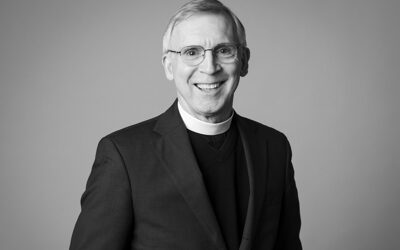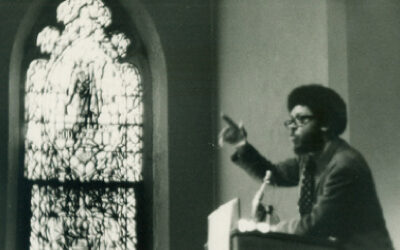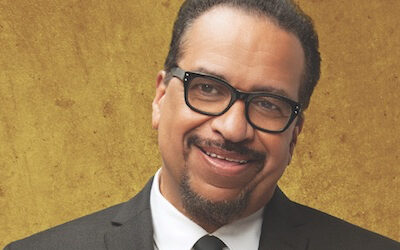Trinity Stories
All Jesus did that day was tell stories—a long storytelling afternoon. His storytelling fulfilled the prophecy: I will open my mouth and tell stories; I will bring out into the open things hidden since the world's first day.Matthew 13:34-35 – The Message
RECTOR’S BLOG
The Rev. Dr. Stephen Applegate
The Porch
Dear Friends,
The weekend essay by David Owen, in this week’s New Yorker magazine is all about porches. Its title, which is itself long enough to be considered an essay is “Inside Out: The magical in-betweenness – and surprising epidemiological history – of the porch.” Owens points out that, during hot months in the era before air-conditioning, a porch was usually the coolest room in a house. Many, although not all homes, are now cooled by artificial climate control, and during steamy weeks, like this past one, we mostly live indoors where the temperature and humidity are comfortable.
Terry and I have an extraordinary front porch at home – one large enough so that, in Spring every year, we create a living room on it. After sweeping and washing the floor, we bring out a cushioned couch and chairs, along with some old wooden rockers we inherited from friends years ago. Because the porch faces east, it’s comfortably in the shade during the late afternoon and evening hours, making it the perfect place to eat supper and read a book. A ceiling fan moves the air on still evenings and, when we run it fast enough, keeps the bugs at bay. A small children’s table and chairs in one corner hearken back to the time our kids were little, and a climbing hydrangea envelopes one of the two brick pillars.
I don’t have a porch here in Toledo; I have a concrete slab outside the living room doors of my apartment instead. My neighbors have done much more with their concrete slabs than I. They’ve put chairs and tables and plants on them – which represents an act of faith, in my opinion, given the neighborhood. No furniture has gone missing – proof that the security firm that patrols the parking lots of the apartment complex is an effective deterrent.
Owens writes, “Porches are semi-magical spaces, intermediate between inside and outside.” The idea of a porch being an intermediate space – a space between “in” and “out.” – led the church I served in Granville to call one of its programs, “The Porch.” The program was intended to be a ministry of hospitality and healing for disaffected Christians and, for all, a non-threatening introduction to alternative views of the Christian faith. During sessions held over five consecutive Sunday evenings, participants had the chance to explore Christianity from different points of view, learn how to take the Bible seriously, but not literally, and what it would mean to live a life that incorporated the values of Jesus.
We believed then, and I still believe now, that crossing a church’s threshold for the first time is really hard for many people – especially those who have experienced any kind of trauma in a religious setting. Meeting on a “porch” was a way to lower the threshold.
Trinity may not have a specific program called “The Porch,” but it has many porch-like opportunities. Earlier this year, we welcomed people to view the solar eclipse during “Totality at Trinity.” A huge crowd came to the Plaza for the Fourth of July fireworks. Music & the Arts concert series represent another “porch.” And later this month, Toledo’s Pride observances will give this parish another opportunity to offer a space that’s “intermediate between inside and outside.”
Is there someone you might invite to the coolest room in the house.?
See you on the porch.
Blessings,
Stephen Applegate
2024 Summer Olympics
Dear Friends,
Paris, France is six hours ahead of Toledo, so the Opening Ceremony of the 2024 Summer Olympics will begin at 1:30 pm today. Hosting the Olympics – whether the summer or winter edition – is an enormous task for any city, and it falls to Paris this year to welcome athletes and spectators from around the world to the games which had their origin in ancient Greece around 3,000 years ago. The ancient games lasted until 393 AD when the Theodosius I banned them to promote Christianity. (Leave it to the Christians to be the party poopers.)
Unlike other opening ceremonies, this year’s will be held outside a stadium. The parade is set to be held in the heart of Paris along the Seine, its main artery. Each national delegation will have a boat which will join a parade of boats moving from east to west in which some 10,500 athletes will cross through the center of Paris. By the way, work on cleaning the Seine for the Olympics has been going on since 2015. More than $1.5 billion has been spent so the river could be used for swimming events. Nine days ago, the mayor of Paris, Anne Hidalgo, took a swim to demonstrate how clean the Seine is now. I’ll spare you the details of how the sewer infrastructure was renovated. It’s enough to say that, even with the building of a giant underground water storage basin in central Paris, planners still hope there won’t be heavy rain between now and August 11.
Not surprisingly, the unique plan has already had an enormous effect on the parts of the Ville lumière – the City of Light. Grandstands and platforms have been under construction since mid-June, a project that was scheduled to be completed yesterday. Only four bridges crossing the Seine have been spared from construction during this preparation time. The upper and lower quays have been closed to the public for the last week. And even the Tour de France – the most famous bicycle race in the world – moved its traditional finish on the Champs-Elysees to a sprint between Monaco and Nice in the south of France.
When the Emperor Theodosius banned the games back in the fourth century, he must have forgotten about all the athletic metaphors employed by St. Paul and others to describe the Christian life. The author of the Epistle to the Hebrews instructs his readers to “run without stumbling the race that is set before [them.]” Drawing on images of ancient footraces in Greece, Rome, and Israel, the Christian life is described as a marathon, not a sprint – one that requires faith, stamina, commitment, and discipline.
Paul reminded the Corinthians that “Every athlete exercises self-control in all things” – and called on them to exercise self-control in a society where there was precious little of it. The letters written to Timothy tell him that only an athlete who is physically fit will win the prize, and that he, as a believer, must do the same. “Train yourself for godliness,” Paul wrote to his mentee. “Train” (Greek gymnazō) literally means “to exercise” and enters the English language as gymnasium. And, in his second letter, Paul tells Timothy that an athlete has to compete according to the rules. Similarly, every believer must live in obedience to God. Paul writes, “An athlete is not crowned unless he competes according to the rules.”
So, while we are watching people whose self-discipline and training has brought them to participate in Olympic-level competition, we might reflect on what kind of shape our spiritual lives are in. And if we find they’re out of shape and flabby, perhaps it’s time to start some kind of training program. Prayer, scripture reading, worship, meditation, journaling, or serving in some way have long been recommended by spiritual coaches as ways to get in good spiritual shape.
Let me paraphrase the opening line of every Olympics, summer or winter, and say, “I declare open the Games of Trinity Episcopal Church, celebrating the 47th Summer Spiritual Games. (187 years Trinity has been in existence, divided by four). Game on!
Blessings,
Stephen Applegate
Coming and going…
Dear Friends,
The Gospel reading for this coming Sunday talks about lots of people “coming and going” around Jesus and his disciples. It seems an appropriate scripture passage for this week when Trinity has lots of comings and goings on among our building partners.
We purposely use the term “building partners” instead of “tenants” for the entities that occupy parts of our building because the parish doesn’t rent space to just any organization or business looking for a downtown location. We choose to share space with organizations that align with Trinity’s mission to be engaged with the life of the City of Toledo and that share our progressive and inclusive values.
Leadership Toledo, our longest-running building partner, has – these last weeks – been steadily moving out of the offices they’ve occupied on the third floor of the Parish House. They’re taking some furniture with them, donating some to Habitat for Humanity’s ReStore, recycling outdated electronics, and tossing out everything else. Trinity shared in the cost of the dumpster Leadership Toledo brought in so we could also clear out the kinds of things that always seem to accumulate at churches. (Thanks, by the way, to the fifteen volunteers who showed up this past Monday evening to help!) We’ll miss our colleagues at Leadership Toledo but take solace and even some satisfaction in this church’s part in providing space for them to grow as they were starting their work with both adults and youth.
While Leadership was moving out upstairs, Toledo Streets Newspaper (TSN) was moving furniture and other items into their new location downstairs in the former Next-to-New space. Their first vendor meeting at Trinity was yesterday and, since it was our turn to provide the vendor lunch, we hosted lunch for them in My Brother’s Place. We are delighted to welcome this organization whose goal is to give the Toledo community a program to lift individuals out of poverty through work. TSN will have access to their space from their entrance on N. St. Clair.
And, finally, while these two organizations were “going and coming,” Trinity finalized an agreement with Girls on the Run Northwest Ohio (GOTR) on Wednesday. In the next two weeks, they will move into some of the space being vacated by Leadership Toledo.
GOTR serves fourteen counties in northwest Ohio and offers programs designed to inspire girls of all abilities to recognize and embrace their inner strength and make meaningful connections with others. It’s about so much more than running! Trained coaches use physical activity and discussions to build social, emotional and physical skills while encouraging healthy habits for life. They’ve served over 7,000 girls in northwest Ohio since 2012.
Part of the national GOTR organization, our newest building partner offers a welcoming space where all can have a meaningful and engaging experience and feel like they belong. When GOTR says “all,” they mean people of all races, ethnicities, income levels, sexual orientations, gender identities, religions, and abilities. Their commitment to radical hospitality mirrors ours.
Farewell and godspeed to our friends at Leadership Toledo, and welcome to our newest building partners. We look forward to many years of mutually beneficial relationships.
Blessings,
Stephen Applegate
Come thirsty this Sunday!
Dear Friends,
We are firmly planted in the dog days of summer and nearly nothing signifies a hot summer day quite like a lemonade stand with eager young sellers situated behind a dressed-up card table in the blaring hot sun. Well, we can spare you the blaring hot sun this Sunday. Our own Melanie Schell will have a lemonade stand during coffee hour to support the fundraising efforts of Isaiah 117 House in Lucas County. As their website states, Isaiah 117 is reshaping the way foster care begins.
When children are removed from their homes out of concern for their safety, they are usually brought to a child welfare services office to await placement. This wait can be a few hours to several days. These children often have nothing with them and are
scared, lonely, hungry, and in dirty clothing.
Isaiah 117 provides a comforting home where these children instead can be brought to wait – a place that is safe with friendly and loving volunteers who provide clean clothes, smiles, toys, and snuggly blankets. This space allows children to receive the comfort and care they need while child welfare staff can do the necessary paperwork and identify a good placement.
What a powerful mission! In a few weeks, George Benson and I will attend an Isaiah 117 ‘church connections’ breakfast with other houses of worship in Lucas County to learn how we Trinity folks can be a support as this unfolds in our area. Come thirsty this Sunday. Let’s draw the circle wide, friends!
Big love,
Heather Meyer
Director of Operations
COMMUNITY ENGAGEMENT
George Benson
“Listening with our Eyes and Breaking our Hearts: Rev. Dr. Kelly Brown Douglas”
In this last installment of my Listening with our Eyes and Breaking Our Hearts series I’d like to introduce you all to Rev. Dr. Kelly Brown Douglas. Since September of 2017, she has been the Dean of the Episcopal Divinity School at Union Theological Seminary. Her...
Listening with our eyes and breaking our hearts: James Baldwin
In my opinion, one of the most moving and important writers or voices of the 20th century was James Baldwin. I first read his book, The Fire Next Time in 2016 and it has left a mark on me that I have yet, and never want to, be rid of. Baldwin was a playwright,...
How can we support those who are around us?
Last week I stated that I wouldn’t be writing much of my own words in these posts this month, and already I must amend that. While I am very excited to dive into some Michelle Alexander, there is other business to attend to. This week is the exception as we have our...
“Listening with our eyes and breaking our hearts: Rev. Dr. James H. Cone”
In his book, Said I Wasn’t Gonna Tell No One, Rev. Dr. James H. Cone, pastor, teacher, theologian, and author points out that theology isn’t universal, and that it all begins with our own experience (pg. 112). So, for the month of February, as it is African American...
MUSIC & THE ARTS
Chelsie Cree
Hasan Green and Pass Me Not O Gentle Savior
Have you ever had the experience of hearing a true singer? Like someone who stops you in your tracks, someone from the moment those vocal folds flutter and the sound hits your ear, you are forced to listen? Well today, friends, I share with you a recording of a...
SONAR: A Music Series… during Lent? Sonar
Sonar: noun , a system for the detection of objects under water and for measuring the water's depth by emitting sound pulses and detecting or measuring their return after being reflected. Lent gives us the opportunity as Christians to look inward. As it is often a...
And We Will Have Been a Part of It
This week, Trinity is opening her doors to TAPA (Toledo Alliance for the Performing Arts) and the Toledo Symphony Orchestra. Three students have competed and won the opportunity to play with the Symphony, and it is in our spiritual home that their dreams will become a...
Richard Smallwood – A Music Legend
My music people, Richard Smallwood is a giant in the gospel music industry. If you don’t know him exactly by name, then you’ll certainly know him by his works. His first big hit was “I Love The Lord”, and is the creator of others like “Total Praise,” which has been...










